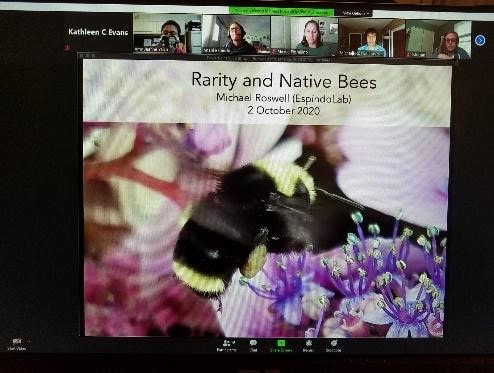Many people are fascinated about the diversity in nature, some are attracted by cichlids with various colors, others were allured by butterflies with different patterns. Katherine Taylor, a new Post-doc in the Fritz lab, was interested in the diversity of the lacewing mating songs.
For nearly the last two decades, STEM educators, particularly those in biology, have been moving toward a more active learning model for undergraduate courses. Dr. Marcia Shofner has been at the forefront of that effort at University of Maryland. Dr. Shofner is a Senior Lecturer in the Entomology Department, teaching several sections per year of Ecology and Evolution. Not only is this course often an early undergraduate’s first introduction to college biology, but it is often a Graduate Teaching Assistant’s first foray into teaching as well. At this week’s colloquium, Dr. Shofner shared a “peer through the lens” into designing and implementing an active learning course with the Entomology community.
 Mike Raupp Mike Raupp In the spring of 2004, millions of 17-year cicadas emerged from the ground. They crawled over trees, houses, and cars. They molted leaving exoskeleton shells on every surface. Birds feasted. Squirrels gorged themselves. Newly planted trees suffered. Children tiptoed though carcasses on their way to school. Parents scraped goo off their car’s wheels. The air vibrated with the cacophonous sound of cicadas. Then they were gone. But next year they are coming back. Whether you anticipate it with dread or excitement, they are coming again. In his colloquium presentation to the UMD Entomology Department, Dr. Mike Raupp, an emeritus entomology professor at the University of Maryland, brought us up to speed on the coming emergence of periodical cicadas. The last time Brood X, the 17-year cicadas local to this area, emerged from the ground, entomologists were in heaven. Dr. Raupp gave numerous talks around the country even ending up on Jay Leno’s late-night show to teach about the fascinating insect. He explained how 17-year cicadas are a great opportunity to get people interested in bugs. Next year, they may be even more numerous due to recent habitat restorations and improved tree cover. UMD Entomologist discover gene critical for survival in other insects missing in mosquitos10/1/2020
Congratulations to Entomology’s Alys Jarvela and Leslie Pick whose paper was just published in Communications Biology. Their research showed that mosquitos lost a gene that is essential for survival in other insects without ill effects. They also found that a related gene stepped in and took over the lost gene’s role. This discovery represents the first time that scientists identified a gene that naturally evolved to perform the same critical function as a related gene long after the two genes diverged down different evolutionary paths.
You can read CMNS press release on the paper here: https://cmns.umd.edu/news-events/features/4664 |
Categories
All
Archives
June 2024
|
Department of Entomology
University of Maryland
4112 Plant Sciences Building
College Park, MD 20742-4454
USA
Telephone: 301.405.3911
Fax: 301.314.9290
University of Maryland
4112 Plant Sciences Building
College Park, MD 20742-4454
USA
Telephone: 301.405.3911
Fax: 301.314.9290


 RSS Feed
RSS Feed




